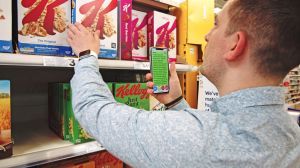
This announcement comes after a successful UK trial last year( see AIPIA newsletter 14-10-20) in partnership with Co-op, on Kellogg’s Coco Pops boxes. Evaluation of the pilot by the UK charity Royal National Institute of Blind People (RNIB) showed that 97% of the participants would like to see more of these accessibility features available on grocery packaging.
Important information on food packaging, such as allergen details, can often be printed in typeface that’s difficult for blind or partially sighted people to read. The new boxes will allow a smartphone to easily detect a unique on-pack code and playback labelling information to these shoppers. All Kellogg's Europe boxes will contain the NaviLens tag in 2022.
“This announcement from Kellogg’s is a real game changer within the packaging world. It marks a significant step-change in how big brands can put accessibility at the forefront of design and packaging decisions and be a catalyst for change," said Marc Powell, strategic accessibility lead at RNIB.
“Designing packaging so that it works for everyone makes complete sense and we hope that other brands will follow Kellogg’s lead in making packaging information more accessible,” said a company spokesperson. Unlike other types of printed codes, the new technology includes high contrasting colored squares on a black background. Users do not need to know exactly where the code is located to scan it.
The first accessible boxes of Special K will appear on shelf next January. The idea came to life when Kellogg’s met with children from St Vincent’s in 2019, a specialist school in Liverpool for children with sensory impairment.
"Over two million people in the UK live with sight loss and are unable to simply read the information on our cereal boxes," says Chris Silcock, head of Kellogg’s UK. "As a company focused on equity, diversity and inclusion we believe that everyone should be able to access important and useful information about the food that we sell. Kellogg’s will be the first company in the world to use NaviLens on packaging. We will share our experience with other brands who want to learn more.”
The technology allows smartphones to pick up the on-pack code from up to 3 metres distance. This then alerts the phone and the shopper can choose to have the ingredients, allergen and recycling information read aloud to them – as well as reading it on their device using accessibility tools.
"The incorporation of the NaviLens codes onto food packaging is a positive step towards a more inclusive and accessible shopping experience for the visually impaired," according to Javier Pita, CEO of NaviLens.







